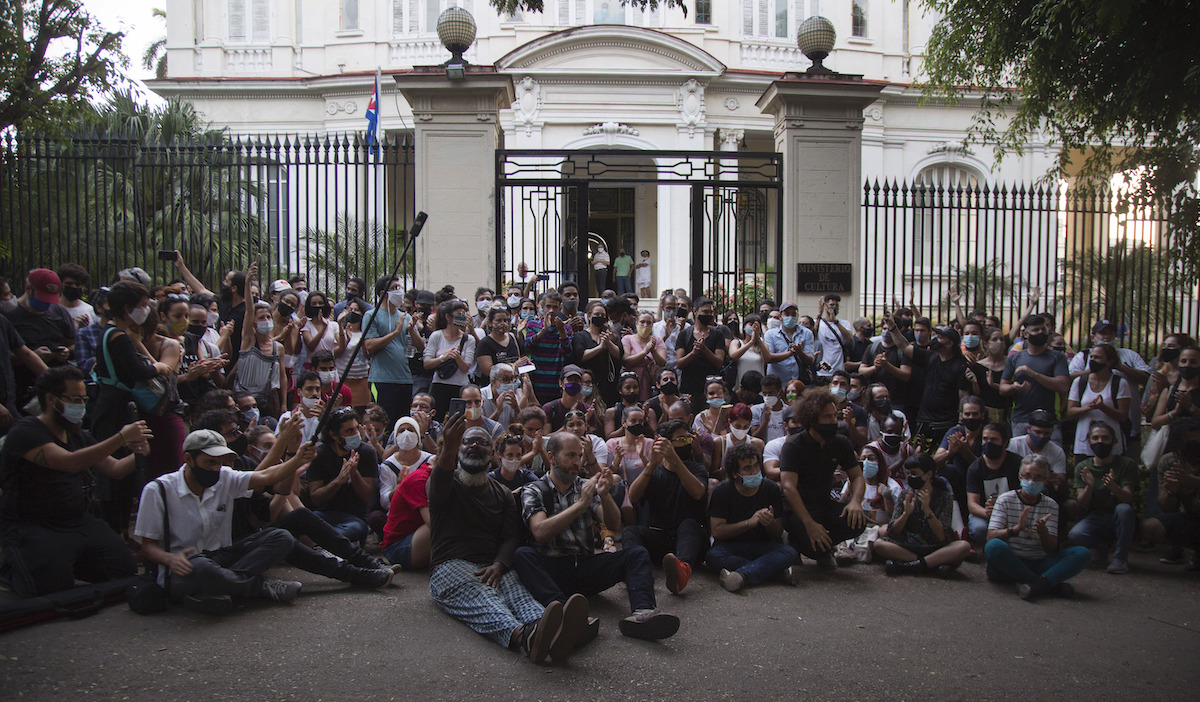

Young artists protest in front of the doors of the Ministry of Culture, in Havana, Cuba, Friday, November 27, 2020. Dozens of Cuban artists demonstrated in front of the Ministry of Culture in Havana on Friday night, protesting against the police evicting a group who participated in a hunger strike. (AP Photo / Ismael Francisco)
The arrest and subsequent eight month sentence of Cuban rapper and activist Denis Solís González has set off an escalating protest movement in Havana and abroad.
Solís was convicted of contempt on November 9 after he spoke out on Facebook about an incident where a Cuban police officer illegally entered his home. His expedited trial sparked a hunger strike that has rapidly gained international attention and marks a new level of opposition to the Cuban government from the artist community.
https://www.facebook.com/denis.solisgonzalez.5/videos/790464094872551/
Members of the artist-activist group El Movimiento San Isidro (MSI) initially took to the streets in solidarity of their friend. They staged poetry readings and marches to peacefully protest the repression of free speech by Cuban authorities. Following days of demonstrations —in which many MSI members were arrested and locked up for short periods of time— the group took a more dramatic approach to civil disobedience.
On November 18, 15 members of the group locked themselves in the MSI headquarters in Old Havana and six began a hunger strike. Luis Manuel Otero Alcántara —one of the founding members of the group and the protest— refused water as well.
Michel Matos, a member of MSI, said the protesters had an absolute conviction to die if it showed the world the intolerance and injustice of the Cuban government. He did not take part in the hunger strike, but was initially providing statements from his home in the Vedado neighborhood of Havana. He said that if he left his home, he would be arrested by the police who had stationed themselves outside.
“They [Cuban authorities] are giving us no choice for a logical or positive solution,” Matos said. “The solution is that Luis will probably die. He is not going to die from his health but from his conviction.”
Supporters have used Facebook, YouTube, and other social media platforms to alert the press and the international community to what they consider the repression of free speech by the Cuban government.
https://www.youtube.com/watch?v=XP4AI-ye2JQ
As more international attention came to the incident, police and state officials showed no signs of yielding to the demands and cordoned off the block where the activists were staging their protest. preventing many friends, family, and supporters from entering the house.
State-run media outlets, including the Twitter account of President Miguel Díaz-Canel Bermúdez, have called the the MSI participants in an “imperialist reality show.”
San Isidro: an imperialist reality show. An imperialist show to destroy our identity & subjugate us again; those plans shall be crushed.#SomosCuba #SomosContinuidad https://t.co/QfR6q8hPdX
— Miguel Díaz-Canel Bermúdez (@DiazCanelB) November 29, 2020
Over the weekend, police entered the MSI headquarters under the premise that the demonstration was a COVID-19 risk and momentarily ended the protest.
Luis Manuel Otero was detained and put in the hospital but no one was able to see him or verify his health condition. Rapper and MSI member Maykel Castillo Pérez continued his hunger strike at home but was also refused visitors or an independent medical examination, said Aminta D’Cárdenas, a member of the group.
“This is part of a policy of racism —the movement is predominantly Black— and systemic repression that the Cuban government exerts on its citizens,” said Abel González, a MSI supporter now living in New York City. “The protesters have been stripped of all legal avenues to claim their rights. Like many Black slaves from the past, they have only been left to pawn their bodies as a guarantee of their freedom with this strike.”
The MSI hunger strike marks a new level of protest from Cuban artists who have used performance art in the past as a tool of dissidence.
“What is really our level of commitment? To what extent are we willing to sacrifice to achieve a change in our country?” said Luis Restoy, a Cuban artist living in New York and supporter of MSI. “The MSI has shown its opposition to the Cuban totalitarian state through cultural actions that have become triggers and calls for attention to the dictatorial policies implemented by the Cuban government.”
It has been a hard week for the Cuban artist community abroad. Restoy has had trouble eating and sleeping while his friends have starved themselves back home, but the MSI are opening people’s eyes to the system of oppression that Cubans have been living in their whole lives, he said.
The artist community in Cuba has become more vocal since the implementation of Decree 349 in December 2018. The law restricts all public art without the strict approval of the ministry of culture, thus censoring artistic free expression.
Amnesty International has called the law a “dystopian prospect for Cuba’s artists.”
Over the weekend, protesters demonstrated outside the Cuban ministry of culture and a Saturday demonstration in the Little Havana neighborhood of Miami were held in solidarity of MSI. The Associated Press reported that the there has been an agreement for dialogue and tolerance between the Cuban government and the artists who have been protesting.
The protest movement is stretching into another week and Michel Matos hopes that more people will show their support.
“The people have a lot of devotion but there is a lot of fear. We’re not leaving the street. We are not asking people to leave the street, even though it’s dangerous, it is our right as citizens,” Matos said.
***


